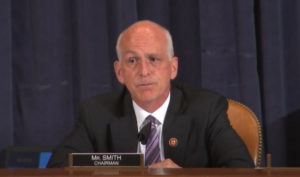The chair of the House Armed Services Committee on Tuesday urged the White House to submit its full budget request to Congress by May 10, adding that any further delay would lead to starting the next fiscal year under a continuing resolution.
“I am deeply concerned about the Biden administration dragging their feet on getting us the damn budget. I understand they have other priorities, and that’s the answer we get back,” Rep. Adam Smith (D-Wash.) said during a Reagan Institute discussion. “Shout it from the rafters. I can’t get the White House to take my calls on this one. Just send it to us. We need it in order to pass the budget and move forward.”

Smith’s comments arrive after the White House released FY ‘22 topline budget numbers last Friday, which included a slightly increased Pentagon budget request of $715 billion, but no details on specific funding items (Defense Daily, April 9).
The HASC chairman on Tuesday reiterated previous comments that he believes the topline debate “borders on irrelevant,” and said Congress must instead focus on how to best spend the money rather than meeting specific marks such as Republican lawmakers call for three to five percent annual budget growth.
“We get obsessed with that number. It could go up. It could go down. The key part is what are we doing with that money? How can we look at that budget right now and get more efficient and effective? I think we really need to look closely at that question,” Smith said. “No, I do not think that we need a three to five percent real growth over inflation in order to achieve what I’m talking about. And if we do, we’re not doing our job.”
Smith also continued his recent criticism of the F-35 fighter program, likely to be a key area of debate during the upcoming NDAA mark-up process, citing it as an area that highlighted a lack of competition in military programs .
“We need competition within the military. Once you give out a contract, once you [go ahead] with the program of record, you are in a bit of a bind because then the contractor has you. You have to buy what they have. We need to try to put competition wherever we can,” Smith said. “I would not suggest for a second that we should’ve built two F-35s just to make sure that they can compete against each other. But how about we compete the maintenance. How about we compete opportunities so not just one entity has the contract.”
In March, Smith told reporters he believes Congress should look to “cut its losses” on the “painful” F-35 program, adding that he wants to “stop throwing money down that particular rathole” (Defense Daily, March 5).
“It’s not so much lamenting the 20 years and how far the F-35 is over budget and all that, it’s that this is a huge decision as we go forward. We are developing new capabilities beyond the F-35. We have upgraded the capabilities of the F-18 and the F-15. So when we’re looking at the next 25 years what is the most cost-effective way to achieve the fighter attack aircraft capabilities that we’re actually going to need. And I don’t really think we’re getting after that question because everyone’s got their own thing to protect,” Smith said.